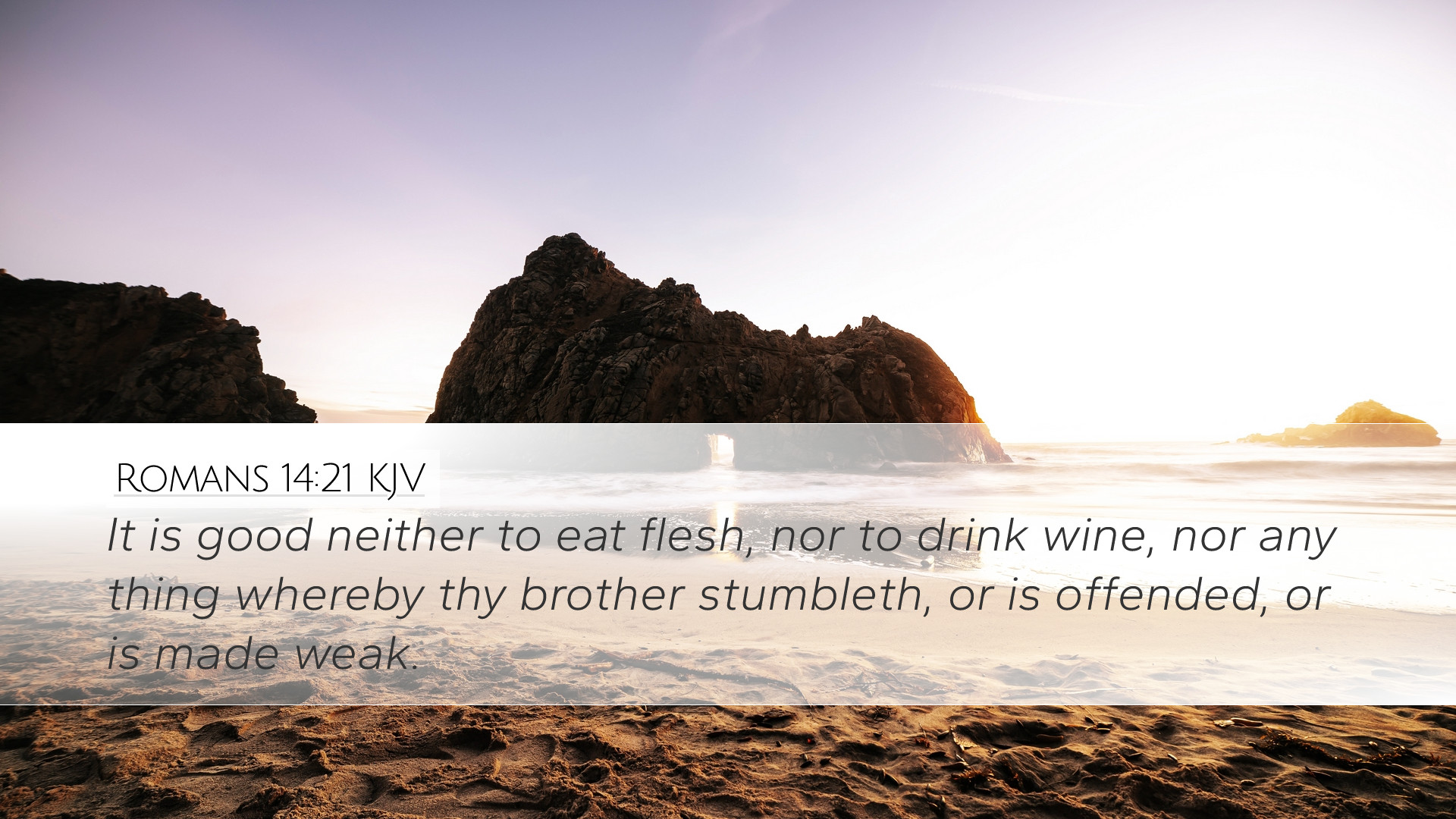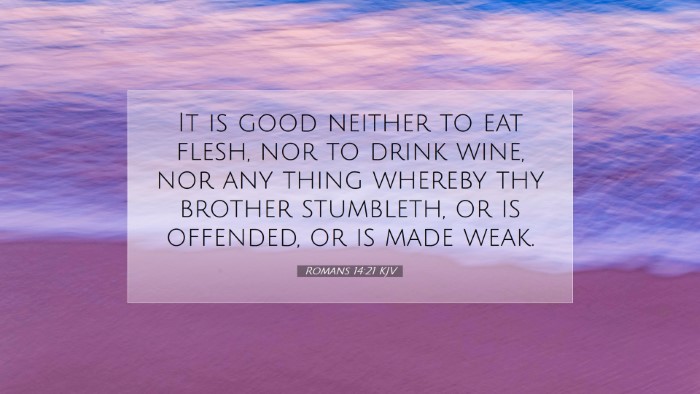Old Testament
Genesis Exodus Leviticus Numbers Deuteronomy Joshua Judges Ruth 1 Samuel 2 Samuel 1 Kings 2 Kings 1 Chronicles 2 Chronicles Ezra Nehemiah Esther Job Psalms Proverbs Ecclesiastes Song of Solomon Isaiah Jeremiah Lamentations Ezekiel Daniel Hosea Joel Amos Obadiah Jonah Micah Nahum Habakkuk Zephaniah Haggai Zechariah MalachiRomans 14:21
Romans 14:21 KJV
It is good neither to eat flesh, nor to drink wine, nor any thing whereby thy brother stumbleth, or is offended, or is made weak.
Romans 14:21 Bible Commentary
Commentary on Romans 14:21
Bible Verse: "It is good neither to eat flesh, nor to drink wine, nor any thing whereby thy brother stumbleth, or is offended, or is made weak." (Romans 14:21)
Introduction
This verse captures the essence of Christian liberty and responsibility within the community of believers. Paul emphasizes the importance of considering the spiritual wellbeing of others and how our actions can influence them.
Contextual Background
The Apostle Paul wrote the Book of Romans to address both Jewish and Gentile Christians in Rome, aiming to unify them in faith. In chapters 14 and 15, he highlights issues surrounding dietary laws and observance of special days, advocating for mutual respect and love among believers.
Key Themes
- Christian Liberty: The freedom to eat or abstain from certain foods is acknowledged, yet tempered by the call to exercise that liberty responsibly.
- Love for Others: The underlying principle guiding believers in their actions towards one another is love, which should prevent offending or causing others to stumble.
- Community and Accountability: Paul’s teaching stresses that individual choices affect the wider community, urging an approach that builds up rather than tears down.
Verse Analysis
1. It is good neither to eat flesh, nor to drink wine: Here, Paul signifies that certain indulgences, while permissible, can lead to negative consequences if they cause a brother to stumble. This emphasizes a higher moral duty to consider the impact of our actions on others.
2. Nor anything whereby thy brother stumbleth: The term "stumble" refers to causing someone to falter in their faith or convictions. This highlights the importance of being sensitive to the scruples and weaknesses of fellow believers. Our behavior should encourage growth rather than tempt someone to sin.
3. Or is offended, or is made weak: Paul identifies different ways in which believers can be negatively affected. Offense may arise from misunderstanding or exposure to practices deemed unacceptable. Being "made weak" points to a potential spiritual decline, prompting believers to act with caution.
Insights from Commentators
Matthew Henry’s Perspective
Matthew Henry emphasizes the balance between liberty and responsibility. He highlights the need for the strong in faith to be cautious not to lead the weak astray, urging mutual respect and understanding. His commentary encourages believers to forgo their rights, recognizing that true liberty is manifested in self-denial when it comes to the edification of others.
Albert Barnes’ Analysis
Albert Barnes illustrates Paul's exhortation as a call to Christian charity, stating that the essence of Christian behavior is not merely about personal freedom but rather about how free actions can affect the faith of others. He draws attention to the great principle of love that should guide eating and drinking, explaining that Christians must prioritize their influence on others over their personal preferences.
Adam Clarke’s Commentary
Adam Clarke provides a linguistic and contextual examination, underscoring that Paul addresses customs affecting both the Jewish and Gentile believers. He notes that observing restraint in matters of food and drink is not an act of legalism but rather a critical expression of love and unity within the body of Christ. Clarke emphasizes that the ultimate goal is the growth of the community in faith and love.
Practical Applications
- Consideration of Others: Believers are called to evaluate their personal freedoms in light of how they might impact others. This requires introspection and a willingness to sacrifice personal preferences for the sake of community cohesion.
- Promoting Unity: Understanding that personal liberties should never come at the cost of another's faith encourages a culture of support and empathy within the church.
- Encouragement and Edification: Christians should strive to build each other up in faith, ensuring that their actions reflect a commitment to the growth and health of their fellow believers.
Conclusion
Romans 14:21 serves as a poignant reminder of the Christian's responsibility toward one another in community. It calls for a careful navigation of personal liberty, urging all believers to consider the spiritual implications of their actions. Ultimately, this verse embodies the heart of Christian ethics—acting in love, promoting unity, and fostering a culture that values the spiritual journey of every member of the body of Christ.


